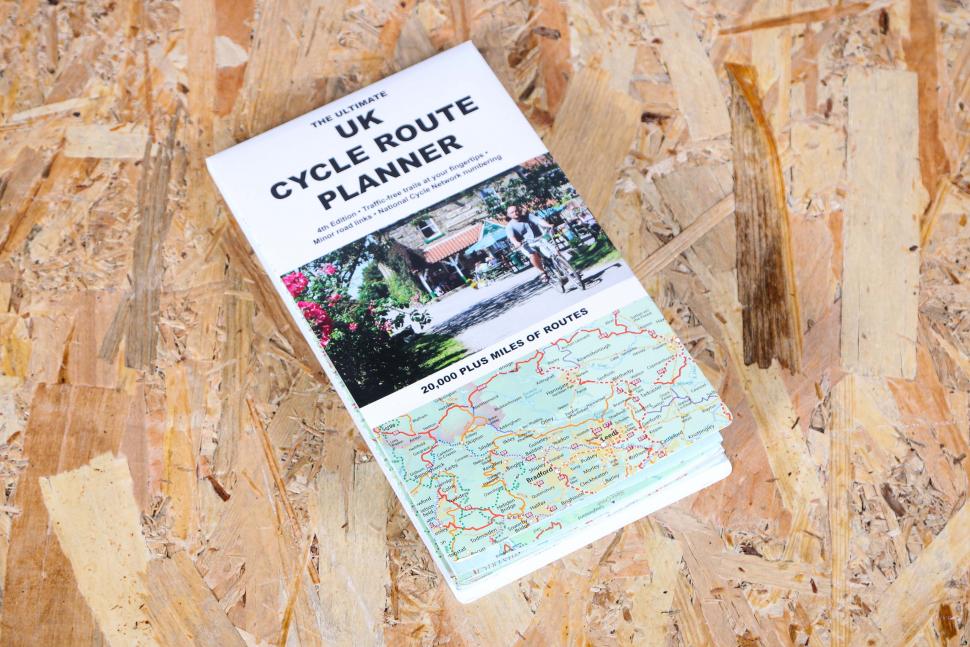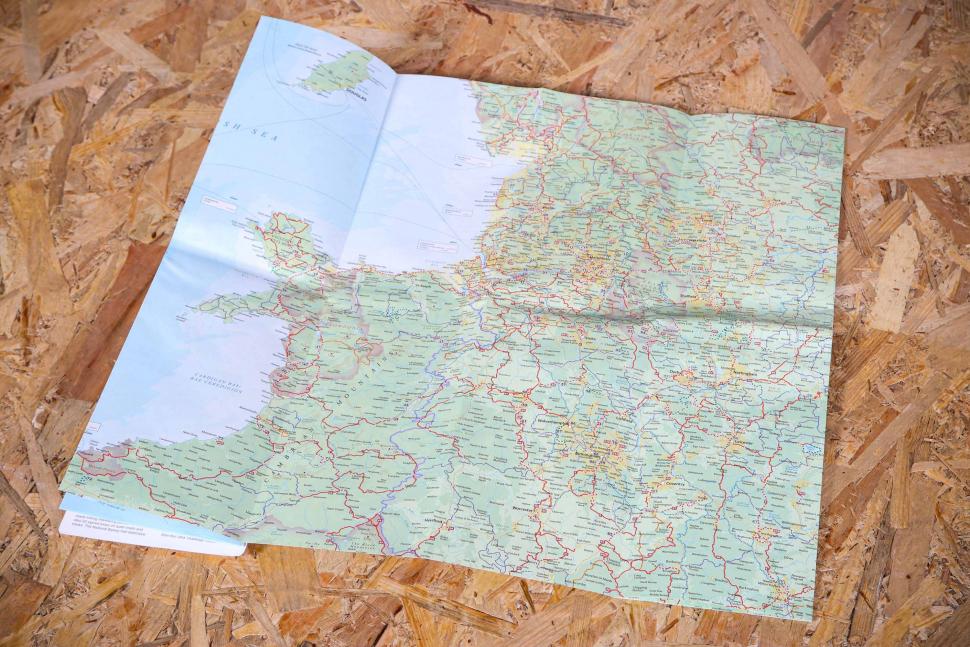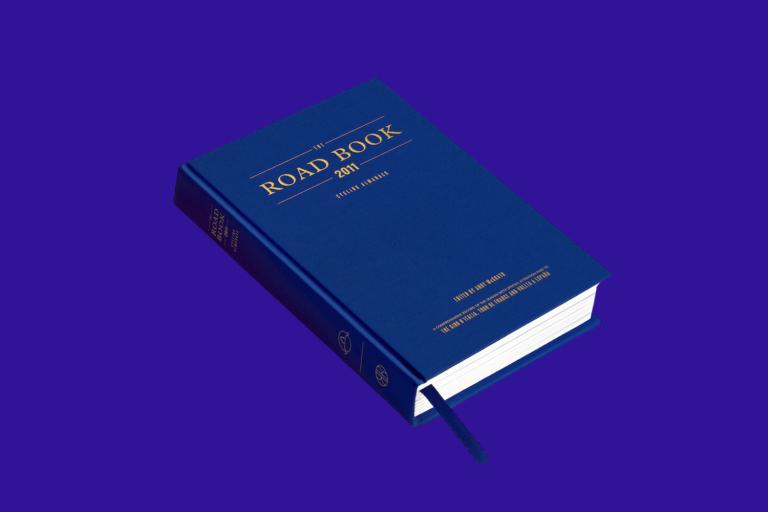- News
- Reviews
- Bikes
- Components
- Bar tape & grips
- Bottom brackets
- Brake & gear cables
- Brake & STI levers
- Brake pads & spares
- Brakes
- Cassettes & freewheels
- Chains
- Chainsets & chainrings
- Derailleurs - front
- Derailleurs - rear
- Forks
- Gear levers & shifters
- Groupsets
- Handlebars & extensions
- Headsets
- Hubs
- Inner tubes
- Pedals
- Quick releases & skewers
- Saddles
- Seatposts
- Stems
- Wheels
- Tyres
- Tubeless valves
- Accessories
- Accessories - misc
- Computer mounts
- Bags
- Bar ends
- Bike bags & cases
- Bottle cages
- Bottles
- Cameras
- Car racks
- Child seats
- Computers
- Glasses
- GPS units
- Helmets
- Lights - front
- Lights - rear
- Lights - sets
- Locks
- Mirrors
- Mudguards
- Racks
- Pumps & CO2 inflators
- Puncture kits
- Reflectives
- Smart watches
- Stands and racks
- Trailers
- Clothing
- Health, fitness and nutrition
- Tools and workshop
- Miscellaneous
- Buyers Guides
- Features
- Forum
- Recommends
- Podcast
review
 2023 The Ultimate UK Cycle Route Planner 4th Edition.jpg
2023 The Ultimate UK Cycle Route Planner 4th Edition.jpg£9.95
VERDICT:
Information-dense map with a vast network of UK traffic-free or low-traffic routes
Vast network of traffic-free routes on one map
The whole UK on one map
Great adjunct to online planners
Over-reliant on Sustrans network
Needs more minor roads
Sheer amount of detail can be confusing
Weight:
130g
Contact:
At road.cc every product is thoroughly tested for as long as it takes to get a proper insight into how well it works. Our reviewers are experienced cyclists that we trust to be objective. While we strive to ensure that opinions expressed are backed up by facts, reviews are by their nature an informed opinion, not a definitive verdict. We don't intentionally try to break anything (except locks) but we do try to look for weak points in any design. The overall score is not just an average of the other scores: it reflects both a product's function and value – with value determined by how a product compares with items of similar spec, quality, and price.
What the road.cc scores meanGood scores are more common than bad, because fortunately good products are more common than bad.
- Exceptional
- Excellent
- Very Good
- Good
- Quite good
- Average
- Not so good
- Poor
- Bad
- Appalling
With almost all the UK's cycle routes on one double-sided map, The Ultimate UK Cycle Route Planner is a really useful companion to online map systems for longer rides.
Online route-planning sites are great, but sometimes you need a bigger view than they provide. The Ultimate UK Cycle Route Planner gives you that wide-angle view. The Route Planner gathers all the UK's designated cycling routes into one map, from the Sustrans National Cycle Network to less-publicised routes like Swans Way in Northamptonshire, Buckinghamshire and Oxfordshire. The only significant network I can think of that's missing is the National Byway, perhaps because its routing on minor roads doesn't fit the Route Planner's traffic-free emphasis.
Unlike a lot of online maps, railway lines and stations are clearly shown here so you can plan train-assisted rides too. Canalside paths are also marked in three degrees of usability: no cycling, NCN cycle route and possibly cycleable.
I do like that 'possibly'. For me, the most memorable rides involve an element of exploration. That can be just riding a new route, but it's exciting to head down a road and not be sure it's actually passable.
If you like a little bit more certainty, you might find the UK Cycle Route Planner is over-reliant on the Sustrans National Cycle Network. Even Sustrans itself has admitted some of the network isn't fit for purpose, and while some of the worst sections have been removed from the official network there's still a high degree of uncertainty when it comes to just what sort of surface quality you should expect. Some of the tracks marked on here are barely passable by mountain bike. For example, there's a section of the Icknield Way south-west of Thetford – marked here among 'cyclable national trails & signed mountain bike routes' – that was six inches deep in sand when I tried to ride it a few years ago.
On the other hand, one of my local trails, Worsted Street Roman Road, is marked as a mountain bike track when it's quite doable on a hybrid or a road bike with 28mm tyres, especially in dry weather.
> 4 reasons why your next bike should be a touring bike
Relying on the Sustrans network brings another problem – that it ignores enormous numbers of great minor roads. The UK's best cycling is on minor roads, because the vast majority of them have proper hard surfaces (albeit battered ones after 13 years of Tory neglect) but very little traffic as drivers stick to A and B roads.
> GPS cycle route planning made easy – how to plan and follow a bike route
The Planner does have some roads marked as 'suggested minor road links' and this is something I'd like to see a lot more of, though I suspect marking all of them would make many areas almost into solid masses of purple. Maybe Excellent Books can set up a method of people submitting approved routes, or use heatmaps from Garmin or Strava that in my experience tend to do a good job of steering away from the busiest roads.
It could be I'm asking for serious scope creep here. The UK Cycle Route Planner focuses on traffic-free routes and does about as good a job as it's possible to do of collecting them all on one map.
Conclusions
I don't think more route information could be crammed into a single map without it having to be unfeasibly large. If your cycling life involves planning longer rides, this map could be a big help.
Who should buy the UK Cycle Route Planner?
If you want to plan longer routes than is easily feasible on a typical online map tool, this is for you.
Verdict
Information-dense map with a vast network of UK traffic-free or low-traffic routes
road.cc test report
Make and model: The Ultimate UK Cycle Route Planner 4th Edition
Size tested: n/a
Tell us what the product is for and who it's aimed at. What do the manufacturers say about it? How does that compare to your own feelings about it?
Excellent Books says:
All of the UK's signed cycle routes together on one map – National Cycle Network and other waymarked cycle routes. Double-sided to cover England, Wales and Scotland.
Brings all of the UK's signed cycle routes together on one map.
Uses the outstanding quality and detail of Times Comprehensive Atlas mapping, Sustrans' National Cycle Network and other popular cycle trails are featured and defined – traffic free or on road.
Family cyclists will love the listed traffic free trails.
Tell us some more about the technical aspects of the product?
Page Size: 120 x 240 mm
Publisher: Excellent Books
Edition: 4th edition, January 2023
Binding: Sheet map (folded)
Illustrations: Colour mapping
Weight: 120g
Rate the product for quality of construction:
8/10
Tidily printed and folded with the cover neatly glued on.
Rate the product for performance:
8/10
Delivers a bunch of useful information in one big ol' map.
Rate the product for durability:
3/10
It's made from paper so best not used as an impromptu umbrella, groundsheet or shield against gunfire.
Rate the product for weight (if applicable)
6/10
Paper construction helps keep the gram-count down.
Rate the product for comfort (if applicable)
6/10
Well-finished edges seem to reduce risk of paper cuts.
Rate the product for value:
9/10
Other cycling-orientated paper maps are in the same ballpark, but just a tenner to have all this information in one place is a bargain!
Tell us how the product performed overall when used for its designed purpose
Very well.
Tell us what you particularly liked about the product
Lots of route possibilities in one gert big map.
Tell us what you particularly disliked about the product
Lack of National Byway; more recommended minor roads would be good.
How does the price compare to that of similar products in the market, including ones recently tested on road.cc?
As far as I can tell the UK Cycle Route Planner is unique. Other cycling-orientated paper maps are in the same ballpark.
Did you enjoy using the product? Yes
Would you consider buying the product? Yes
Would you recommend the product to a friend? Yes
Use this box to explain your overall score
This is a very good idea, well executed.
About the tester
Age: 56
I usually ride: Scapin Style My best bike is:
I've been riding for: Over 20 years I ride: Most days I would class myself as: Expert
I regularly do the following types of riding: commuting, touring, club rides, general fitness riding, mtb,
John has been writing about bikes and cycling for over 30 years since discovering that people were mug enough to pay him for it rather than expecting him to do an honest day's work.
He was heavily involved in the mountain bike boom of the late 1980s as a racer, team manager and race promoter, and that led to writing for Mountain Biking UK magazine shortly after its inception. He got the gig by phoning up the editor and telling him the magazine was rubbish and he could do better. Rather than telling him to get lost, MBUK editor Tym Manley called John’s bluff and the rest is history.
Since then he has worked on MTB Pro magazine and was editor of Maximum Mountain Bike and Australian Mountain Bike magazines, before switching to the web in 2000 to work for CyclingNews.com. Along with road.cc founder Tony Farrelly, John was on the launch team for BikeRadar.com and subsequently became editor in chief of Future Publishing’s group of cycling magazines and websites, including Cycling Plus, MBUK, What Mountain Bike and Procycling.
John has also written for Cyclist magazine, edited the BikeMagic website and was founding editor of TotalWomensCycling.com before handing over to someone far more representative of the site's main audience.
He joined road.cc in 2013. He lives in Cambridge where the lack of hills is more than made up for by the headwinds.
Latest Comments
- mdavidford 7 hours 42 min ago
You forgot ignoring half the race to show awkward interviews with the riders' Proud Parents™ instead.
- mdavidford 7 hours 46 min ago
Obviously it means 'springing out of the bunch' on a critical sector. Or maybe it's referring to the time of year.
- David9694 8 hours 33 min ago
Car crashes through garden wall for second time in 18 months https://www.wiltshire999s.co.uk/car-crashes-garden-second-time/
- David9694 8 hours 35 min ago
Woman taken to hospital after flipping car onto roof in Trowbridge...
- A V Lowe 9 hours 17 min ago
Its blindingly obvious from the image that the DKE of the buses include the mirrors which extend to nearly reach the edge of the tarmac pavement on...
- Sredlums 9 hours 50 min ago
It's sad when being very good at your job - any job - isn't enough to earn a decent living. It shouldn't be that way....
- eeney 10 hours 2 min ago
Bont double wide wearer here. Even Lake, for me, are too narrow in the toebox and midfoot, but Lake work for a lot of people....
- chrisonabike 11 hours 30 min ago
I never heard of anyone having their leg sliced off / unexpectedly wiping out using a spoon brake, but discs...
- chrisonabike 11 hours 32 min ago
Meanwhile, in the Netherlands... (cycling to hospital, s''Hertogenbosch, Utrecht. Cycling to hospital and cycle parking, Assen)....















Add new comment
82 comments
Same franchise since 1997? Sounds like long past time for a change - almost at any cost!
America and the UK seem to function at the large level as "time share states". Two franchises with two colours, you can have one or another but that's it (any chance of a Plaid Cymru majority?) They've grown closer to each other over time and after a short time graft sets in whoever's the government. (For a moderate level of graft compared to many places of course...) Switch sides and repeat. Maybe the best we can hope for (Churchill's "best of the worst")?
Does anyone have experience of the more "coalition"-style of democracies? The major drawback there seems to be gridlock - but then you can get the same e.g. in the US.
Wales is basically a one party state.
Roll on the revolution.
If you think fascism is impossible for non-white people or politicians, you're demonstrating your own ignorance. There have been numerous regimes in Africa that have demonstrated some or all of the most significant traits of fascism, and far right Hindu nationalism in India very definitely does so. I would not say that our current government, much as I abhor it, is exhibiting signs of fascism, but claiming that a government can't be fascist because it has a range of races in its ranks is quite patently ridiculous.
Once again Rendel you miss the point spectacularly.
I didn't say that non white people aren't capable of racism or race based policies, that's simply your fevered imagination at work once more.
The point is that we have a very diverse and representative government relative to every other country in Europe. The cabinet has members from multiple ethnicities and religious backgrounds.
We welcome immigrants from every corner of the globe and non European immigration has increased hugely under the policies of said government.
In that regard the government and its immigration policies are the exact antithesis of 1930s European fascism for which racial and/or religious purity was a cornerstone.
I'm struggling to think of a significant difference between any of them.
If I had to find something positive to say about any of them though, the Blair years were better for the British people than for Iraqis and Afghans.
You don't think the fact that council budgets have been cut on average by 37% in real terms since 2010 has had any effect on the ability of councils to maintain the road network properly?
No, not least because the highways agency get 20bn to spend on roads of which a large chunk is maintenance, because councils, and not all councils have responsibilities for roads, do have the budget to fix potholes properly, it's down to them to choose how to spend their budget, alot of them divert those funds to other projects, which is their choice, and voters choice to challenge them on funding priorities.
Do you think councils should just have unlimited budgets to keep fixing potholes, and more often not revisiting the same spots repeatedly year after year, or be challenged to fix them properly?
Personally I'd like to see higher levies on utilities for digging up roads as they seem to be increasingly making a poor job of filling them in which leads to more potholes the councils then pay to fix.
Ultimately none of that has anything to do with the map being reviewed here which for most cyclists could easily be offered as an app download which then fixes the durability, and would allow for better handling of the detail and additions and minor roads left out and might be a more relevant aspect to highlight.
Seems to me that more money should come from logistics companies and heavy vehicles that do the most damage to the roads. Rather than the continual freeze on fuel tax, there should be a road damage tax that applies to the heaviest vehicles. Ideally, that should go directly towards a central fund for repairing roads properly and not just for the improvement of London roads.
Yes. Too many "public liabilities, private (company) benefits" in our system. Sadly that doesn't fit very well (for the general public) with the popular idea of "cut taxes all round". But no-one wants to pay for what it seems they can get for free.
The greater coordination of street works is - AFAIK - a significant difference between the UK and e.g. NL.
However - there are also other things like the trend (deliberate policy) long-term of promoting road transport over e.g. rail. And the growing axle weight of private cars. Lots of little can still be a lot... As Hawkinspeter suggests factoring in vehicle weight to taxes might help here, since the old VED will need to change as electric vehicles come in.
So you don't feel that having their budget cut by 37% will have some influence on the choices the council has to make? That sounds rather Tory thinking, if you'll excuse me saying so, take away more than a third of the budget and then say you ought to still be providing the same level of service, it's just you are choosing not to. National Highways (it's not been called the Highways Agency since 2015) is only responsible for the maintenance of motorways and major A roads, by the way, so nothing to do with the minor roads Jon mentioned here.
No, Suffolk spend around 30million a year on pothole repairs, and they have responsibilities across the major road network in places where youd expect the HA to own the problems.
Alot of their repairs are repeat jobs and theyve been wasting money continually fixing the same issue, consequently theyve just signed a deal worth 1billion over 20 years so upping the spend to 50million with inflation over the 20 years, with a new firm who its hoped will do a better job and cut the waste of repeatedly fixing the same problems that is just burning their money.
Councils are great at spending all their budgets, unless you keep them focused on delivering results.
Maybe that is "Tory thinking" but I'd rather a council were forced to make the budget they get deliver the best value, and deliver efficiency, than give them blank cheques.
Wow, 20 comments and counting on a review about a £10 book! It's pointless to engage in an argument about whether or not the state of the roads is the fault of the conservative government IMO. My point was that snarky political pronouncements should probably be kept out of cycling reviews. The answer to why our roads are closer to third world than first world in places will be a complicated and multi faceted one, hence my comment about it being a cheap and lazy shot. No doubt funding will play a part, but so will the choices that are made by local councils. As another poster has pointed out, the recent global pressures on the public purse have an influence as well. I just think that if the reviewer wants to make a political point about our road network, maybe he should see if Road.cc will let him post a different article - 'Our Crap Roads And Why This Is All the Fault of the Evil Cyclist Hating Tories' perhaps?
It's almost like road.cc make a deliberate editorial choice to produce contentious content in order to drive clicks and comments.
In this regard they've delivered a masterclass today.
You do realise that if you hadn't jumped in complaining about a throwaway political remark none of this discussion would have happened? Most people would have just passed over it with a nod or a sigh depending on their politics. You tossed the snowball and now you're complaining about the avalanche!
No Rendel. This is Road.cc generating unnecessarily contentious and click-baity content like a... *checks notes* ... Review of a Route map.
Storm, meet teacup
I know, bastards. There was a right old to-do over on a thread under a review of a cycling anorak as well, surely they must have realised what will happen if you just go around willy-nilly reviewing anoraks?
The irony is they seem like anoraks themselves!
Yes, of course I realise that (but nice analogy, like it). I confess I assumed it would provoke some response (most likely from the author, however he is conspicuous by his absence), but clearly not the extent. This was evidently a naive assumption, but I'm new to this forum! I'm not complaining, it's all good knockabout stuff (though totally off topic, obvs).
Nothing state funded works better today than in 2010. Deny it all you wish but the facts care nothing for your feelings
But we've taken back control and got it done. Surely that counts for something?
Yes, of course you're right, please accept my sincere apologies. Meanwhile in other news the cycling map reviewed in this article looks marvellous. But that's probably because it's UK only...whoops sorry did it again...
That statement applies in Wales and Scotland too.
That implies that the cause is not necessarily party political.
It's almost like we've had a global financial crisis followed by a global pandemic that have both coincided with the baby boomer population bulge moving into retirement and starting to require increasing amounts of public services.
Barnet formula means that spending cuts by the westminster government entail less money in the devolved regions. They can allocate it differently, but it is difficult to have a bigger pot to spend.
The Welsh government get about £1.20 for every £1 spent on devolved services in England.
The fact that they deliver worse services with a 20% higher budget is quite telling.
The Welsh Government can also raise taxes to fund services. They choose not to.
The UK tax take is now projected to be the highest since WW2 as a percentage of GDP. We are still running an annual deficit with the national debt now a whisker short of 100% of GDP.
Two huge global crises in short succession with a concurrent huge demographic shift have wreaked havoc with government finances across the developed world.
The idea that increased funding for public services can easily be achieved is a fallacy.
How much would that realistically raise?
'Off shore tax loopholes' are almost impossible to eliminate so realistic gains are minimal.
Inheritance tax raises small amounts in governmental terms, any significant increase in rates will simply lead to more avoidance so again gains are minimal.
Fuel duty increases would help but the overall take will still decline precipitously as EVs become commonplace so will be a short term help at best. It will also decrease discretionary spending elsewhere and push up inflation.
Pavement parking fines will be minimal in the grand scheme of things and I believe the necessary legislation to allow councils to fine for this is already in progress.
Legalising some drugs will almost certainly happen as this is an easy win and has been done in US already.
Defunding the military during the first major European land war in 75 years might not be the best choice.
Maybe I've misread the room, but the current bunch of muppets don't seem at all inclined to make progressive moves on drug classification.
I'm not going to address your other complaints as they can be easily addressed, but will take too much space here - the point is that there's plenty that can be done to improve the public purse, but there's no evidence that the Tories have any interest in that - they seek to destroy public services so that they can sell them off cheap to their mates to make a quick buck.
And what's the motivation for the SNP and Welsh Labour to destroy public services?
Both are running an NHS that is significantly underperforming relative to an English NHS that is apparently being deliberately run into the ground.
The current take take is at post war highs in terms of GDP.
Is that not evidence that the Conservative government is interested in 'improving the public purse'?
Are they wanting to do that or are they being backed into a corner due to reduced money in real terms?
I'd also be wary of just looking at the numbers when trying to evaluate something as complicated as the NHS.
To my mind, the most important political job is to remove the Tories from power as soon as possible. Once we've got rid of them, let's deal with the other politicians (of any party) that work against the public interest and for personal profit.
In Wales it's a definite choice to underfund the NHS.
Welsh Labour actually spend less on the NHS as a percentage of their budget than the Conservatives do in England. The resultant underfunding is a political choice.
The Conservatives are a convenient bogeyman but most people choose to ignore the fact that public services are mostly better in England than they are in Scotland and, especially, Wales.
Pages